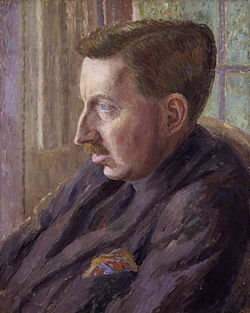E.M. Forster Quote
He built up a situation that was far enough from the truth. It never occurred to him that Helen was to blame. He forgot the intensity of their talk, the charm that had been lent him by sincerity, the magic of Oniton under darkness and of the whispering river. Helen loved the absolute. Leonard had been ruined absolutely, and had appeared to her as a man apart, isolated from the world. A real man, who cared for adventure and beauty, who desired to live decently and pay his way, who could have travelled more gloriously through life than the Juggernaut car that was crushing him.
E.M. Forster
He built up a situation that was far enough from the truth. It never occurred to him that Helen was to blame. He forgot the intensity of their talk, the charm that had been lent him by sincerity, the magic of Oniton under darkness and of the whispering river. Helen loved the absolute. Leonard had been ruined absolutely, and had appeared to her as a man apart, isolated from the world. A real man, who cared for adventure and beauty, who desired to live decently and pay his way, who could have travelled more gloriously through life than the Juggernaut car that was crushing him.
Related Quotes
My mouth opened.It happened.Yes, with my head thrown into the sky, I started howling.Arms stretched out next to me, I howled, and everything came out of me. Visions pored up my throat and past voices...
Markus Zusak
Tags:
city, desperate, howling, i wouldn t lie down, intensity, loud, remember, sky, something to offer, throat
About E.M. Forster
Edward Morgan Forster (1 January 1879 – 7 June 1970) was an English author. He is best known for his novels, particularly A Room with a View (1908), Howards End (1910) and A Passage to India (1924). He also wrote numerous short stories, essays, speeches and broadcasts, as well as a limited number of biographies and some pageant plays. His short story "The Machine Stops" (1909) is often viewed as the beginning of technological dystopian fiction. He also co-authored the opera Billy Budd (1951). Many of his novels examine class differences and hypocrisy. His views as a humanist are at the heart of his work.
Considered one of the most successful of the Edwardian era English novelists, he was nominated for the Nobel Prize in Literature in 22 separate years. He declined a knighthood in 1949, though he received the Order of Merit upon his 90th birthday. Forster was made a Member of the Order of the Companions of Honour in 1953, and in 1961 he was one of the first five authors named as a Companion of Literature by the Royal Society of Literature.
After attending Tonbridge School, Forster studied history and classics at King's College, Cambridge, where he met fellow future writers such as Lytton Strachey and Leonard Woolf. He then travelled throughout Europe before publishing his first novel, Where Angels Fear to Tread, in 1905. The last of his novels to be published, Maurice, is a tale of homosexual love in early 20th-century England. While completed in 1914, the novel was not published until 1971, the year after his death.
Many of his novels were posthumously adapted for cinema, including Merchant Ivory Productions of A Room with a View (1985), Maurice (1987) and Howards End (1992), critically acclaimed period dramas which featured lavish sets and esteemed British actors, including Helena Bonham Carter, Daniel Day-Lewis, Hugh Grant, Anthony Hopkins and Emma Thompson. Director David Lean filmed another well-received adaptation, A Passage to India, in 1984.
Considered one of the most successful of the Edwardian era English novelists, he was nominated for the Nobel Prize in Literature in 22 separate years. He declined a knighthood in 1949, though he received the Order of Merit upon his 90th birthday. Forster was made a Member of the Order of the Companions of Honour in 1953, and in 1961 he was one of the first five authors named as a Companion of Literature by the Royal Society of Literature.
After attending Tonbridge School, Forster studied history and classics at King's College, Cambridge, where he met fellow future writers such as Lytton Strachey and Leonard Woolf. He then travelled throughout Europe before publishing his first novel, Where Angels Fear to Tread, in 1905. The last of his novels to be published, Maurice, is a tale of homosexual love in early 20th-century England. While completed in 1914, the novel was not published until 1971, the year after his death.
Many of his novels were posthumously adapted for cinema, including Merchant Ivory Productions of A Room with a View (1985), Maurice (1987) and Howards End (1992), critically acclaimed period dramas which featured lavish sets and esteemed British actors, including Helena Bonham Carter, Daniel Day-Lewis, Hugh Grant, Anthony Hopkins and Emma Thompson. Director David Lean filmed another well-received adaptation, A Passage to India, in 1984.
